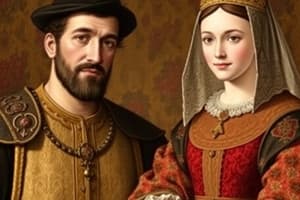Podcast
Questions and Answers
What event marked the end of Moorish control of Spain in 1492?
What event marked the end of Moorish control of Spain in 1492?
- The Reconquista
- The Spanish Inquisition
- The Fall of Granada (correct)
- The Conquest of the Americas
Why did the Spanish conquistadors believe they were fighting in the 16th century?
Why did the Spanish conquistadors believe they were fighting in the 16th century?
- For both god and their country (correct)
- For their own personal gain
- Only for their country
- Only for their king and queen
What was the main reason for the Spanish to explore west across the Atlantic Ocean in 1492?
What was the main reason for the Spanish to explore west across the Atlantic Ocean in 1492?
- To search for new resources
- To spread Christianity
- Because the routes to the east and Africa had already been explored (correct)
- To find new trade routes
What was the Spanish Inquisition's role in Spain after 1492?
What was the Spanish Inquisition's role in Spain after 1492?
What was the outcome of the Spanish Inquisition's actions towards Jews and Muslims in Spain?
What was the outcome of the Spanish Inquisition's actions towards Jews and Muslims in Spain?
What was the legacy of the Muslim Moors in Spain?
What was the legacy of the Muslim Moors in Spain?
What was the role of the Spanish Parliament, also known as the Cortes?
What was the role of the Spanish Parliament, also known as the Cortes?
What was the result of the marriage of King Ferdinand II and Queen Isabella I in 1479?
What was the result of the marriage of King Ferdinand II and Queen Isabella I in 1479?
What was the motivation behind the Spanish exploration of the Americas?
What was the motivation behind the Spanish exploration of the Americas?
What was a characteristic of the art and architecture of the Muslim Moors in Spain?
What was a characteristic of the art and architecture of the Muslim Moors in Spain?
Flashcards are hidden until you start studying
Study Notes
The History of Spain and Its Worldview
- The Iberian Peninsula has been invaded and conquered many times in its history, shaping its worldview.
- Christianity was the dominant religion initially, but in 711, the Moors crossed the Strait of Gibraltar from North Africa, introducing Muslim rule that lasted over 700 years.
The Reconquista and Unification of Spain
- The Reconquista was the move to retake the Iberian land under Muslim control, which ended Moorish control in 1492.
- The Spanish conquistadors felt they were fighting for both God and their country, believing it was their duty to convert non-believers to Roman Catholicism.
Spanish Royalty and the Spanish Inquisition
- In 1479, the two largest kingdoms in Spain were unified with the marriage of King Ferdinand II and Queen Isabella I.
- The Spanish Inquisition was reinstated in 1492, judging whether a Spaniard was following the Roman Catholic Church, giving the King and Queen strong control over the country.
- Eventually, all Jews and Muslims, even those who had converted to Catholicism, were expelled from Spain; the Inquisition lasted until 1834.
Spanish Exploration and Expansion
- Queen Isabella and King Ferdinand wanted to expand Spain's powers and land, deciding to explore west across the Atlantic Ocean in 1492, led by Christopher Columbus.
- Motives for exploration included spreading the Roman Catholic faith, seeking economic gains, and demonstrating Spanish cultural superiority.
Contact with the Moors and Islamic Influence
- The Moors brought Islamic culture, architecture, and design to the Iberian Peninsula, influencing Spanish learning, art, and architecture.
- The city of Cordoba became a center of learning and the arts during the Middle Ages, with Muslim and Jewish scholars reviving ancient Greek and Roman culture and philosophy.
Spanish Political and Economic Systems
- The king and queen were the highest political power in Spain, with a central authority and separate parliamentary and administrative institutions for each kingdom.
- The Spanish parliament, the Cortes, ensured new laws were in the best interest of the country, but its powers were reduced under King Ferdinand and Queen Isabella's rule.
Studying That Suits You
Use AI to generate personalized quizzes and flashcards to suit your learning preferences.




